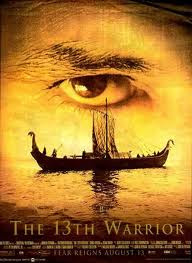The 13th warrrior
The first thing that strikes you about The 13th Warrior is its parallels with Beowulf and Ibn Fablan’s risala. Michael Chrichton intermingles the two to make a new exciting story, while adding his own contemporary touches. Much of the basic plot comes from Beowulf while many traditions and customs are taken from the Risala.
The main plot points come from the Beowulf story, as I believe it was Chrichtons intention to rework the story of Beowulf. The 13th Warrior opens with a dying king and ends with a dying king; similarly Beowulf opens and closes with the funerals of its kings. It seems representative of the circularity of life. The funeral of a king is treated with great reverence and respect in The 13th Warrior, Ibn Fablan’s Risala, and Beowulf.
The 13th Warrior follows very closely the description of a king’s burial from the Risala, with the king being burned on a boat along with his slave girl, although it leaves out the grotesque way in which she is actually killed in the Risala. The slave girl is lifted into the air and repeats a verse about seeing her fellow brethren and wanting to join them. This is also repeated at the end of The 13th Warrior but it has the effect of being a war chant and seems to instil the men with courage rather than the sadness you would associate with a funeral rite, it has morphed into something else entirely. This is a link to the chant in The 13th Warrior, used as a war chant. http://www.youtube.com/watch?v=RN-no1Ka7yU
Buliwyf: 'Lo, there do I see my father. 'Lo, there do I see...
Herger the Joyous: My mother, and my sisters, and my brothers.
Buliwyf: 'Lo, there do I see...
Herger the Joyous: The line of my people...
Edgtho the Silent: Back to the beginning.
Weath the Musician: 'Lo, they do call to me.
Ahmed Ibn Fahdlan: They bid me take my place among them.
Buliwyf: Iin the halls of Valhalla...
Ahmed Ibn Fahdlan: Where the brave...
Herger the Joyous: May live... ``
Ahmed Ibn Fahdlan: ...forever.
Herger the Joyous: My mother, and my sisters, and my brothers.
Buliwyf: 'Lo, there do I see...
Herger the Joyous: The line of my people...
Edgtho the Silent: Back to the beginning.
Weath the Musician: 'Lo, they do call to me.
Ahmed Ibn Fahdlan: They bid me take my place among them.
Buliwyf: Iin the halls of Valhalla...
Ahmed Ibn Fahdlan: Where the brave...
Herger the Joyous: May live... ``
Ahmed Ibn Fahdlan: ...forever.
The idea of a monster coming when it can not be seen properly is common between Beowulf and The 13th Warrior, at night in Beowulf and in the fog in The 13th Warrior, it brings greater fear to the men, as many fear what they don’t know. There are also three big fights in The 13th Warrior, each of them reminiscent of a fight in
Beowulf, but while there are supernatural elements in Beowulf there are none in The 13th Warrior. This is encouraging for the men, for when Ibn Fablan realises the ‘bears’ are just men he is relieved as men are defeatable. Beowulf’s fight with the dragon is
incorporated but with a twist, instead of a dragon, there are hundreds of the enemy tribe holding flaming torches and they are depicted as a fire breathing serpent. The evil tormentor in the story of The 13th Warrior also has a mother that needs to be defeated, like grendels mother in Beowulf.
Characters and character names in The 13th Warrior are very similar to those in Beowulf. While the central character is that of Ibn Fablan, he is intermixed with a range of characters based on those from Beowulf. Such as the kings name being Rothgar in the 13th warrior and Hrothgar in Beowulf. The character of Unferth is also represented in the form of Wigilaf, both have murdered there brothers. Most obviously the leader of the tribe Bulwyf can be compared to Beowulf, but while Beowulf was a man of superhuman strength, Bulwyf is entirely mortal. Both characters were extremely brave and die in battle as kings.
As we can see from the similarities in the funeral procession, there are many customs that have been taken directly from the Risala, one being the way in which the tribe wash and spit into the same basin of water, and this is then repeated by every member of the group. A custom from Beowulf that can be seen in The 13th Warrior is that of paying a blood price for someone you have killed, while this is taken very seriously in Beowulf it is almost comical in the 13th warrior in the easy way in which it is handed over. Paying a blood price is not in any way a deterrent to killing someone in The 13th Warrior.



No comments:
Post a Comment